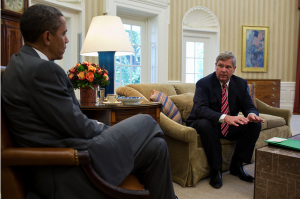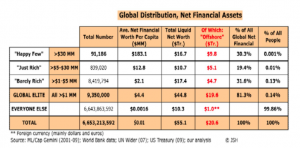As gobsmacked as I am that no one can seem to find the people running Bain Capital from 1999 to 2002, when Mitt Romney was officially listed as its CEO, Chairman, and President, I’m equally shocked by Glenn Kessler’s claims that SEC documents are not to be trusted.
Kessler’s scarequoted SEC documents
On Thursday, Kessler suggested SEC filings don’t mean what they say.
There appears to be some confusion about how partnerships are structured and managed, or what SEC documents mean. (Just because you are listed as an owner of shares does not mean you have a managerial role.)
Then on Friday, he mocked the journalistic convention that treated “SEC documents” (his scarequotes) as factual.
There is a journalistic convention that appears to place great weight on “SEC documents.” But these are public filings by companies, which usually means there are not great secrets hidden in them. The Fact Checker, in an earlier life covering Wall Street, spent many hours looking for jewels in SEC filings.
[snip]
We had examined many SEC documents related to Romney and Bain in January, and concluded that much of the language saying Romney was “sole stockholder, chairman of the board, chief executive officer, and president” was boilerplate that did not reveal whether he was actually managing Bain at the time. (For instance, there is no standard definition of a “chief executive,” securities law experts say, and there is no requirement for anyone to have any responsibilities even if they have that title.)
Trillions of dollars are traded based on what these documents say, but a purportedly respectable journalist who used to cover Wall Street says they’re just boilerplate.
Only, he didn’t used to say that.
As Kessler reminds his readers, he used to cover finance. So to see how he, as a finance reporter, treated SEC documents, I thought I’d review what he wrote during precisely the period Mitt’s corporate whereabouts are in such dispute, 1999 to 2002. Kessler covered finance at the WaPo from the time he moved there in 1998 until about May 2, 2002, when he started covering foreign affairs. Thus, Kessler stopped covering finance just weeks after the time Mitt resigned from the boards of Marriott and Staples (presumably Mitt’s severance deal with Bain was around the same time).
SEC filings, more SEC filings, and no boilerplate
It was an interesting time to cover finance, too. In addition to a slew of articles engaged in one-side, other-side journalism citing experts warning that Bush’s tax cuts might bring back deficit spending but Pete Domenici and Ari Flesicher saying they wouldn’t so he couldn’t really be sure, Kessler covered growing awareness about tax havens, the end of the Dot-Com bubble, the AOL Time-Warner merger, and Enron. And in a number of those stories he treated earnings reports and other SEC documents as transparent truth.
Kessler pointed to corporate earnings reports for a January 29,1999 story predicting the economy would begin to slow.
Corporate earnings are closely watched on Wall Street because, in a world of dreams, deals and wild bets, earnings are real; they are the equivalent of batting averages for baseball addicts. Corporate earnings also provide hints on the general direction of the economy, which is why some analysts remain downbeat about the economy in the coming year despite the string of positive earnings reports. [my emphasis]
And he looked at them in very close detail.
Individual corporate earnings reports also turn up nuggets of how companies have boosted their profits. Compaq Computer Corp., the world’s number two computer maker, said Wednesday that fourth-quarter earnings rose a better-than-expected 2.2 percent. Profits rose to 43 cents a share, compared with 42 cents in the same period of 1997. But tax credits from Compaq’s purchase of Digital Equipment Corp. last year significantly cut the company’s tax rate, boosting net income about 5 cents a share.
In a January 13, 2000 story explaining different estimates for the value of the AOL Time-Warner deal, Kessler reveals the WaPo was the only paper to look beyond stock price in its calculations; it included Time-Warner’s debt, presumably gleaned from SEC documents.
A February 2, 2002 piece purporting to confirm that Enron had not dodged taxes focused closely on SEC documents (a Congressional Joint Committee on Taxation determined Enron had, in fact, dodged taxes from 1996-1999).
A close review of Enron’s financial statements and interviews with tax specialists and accountants indicate that Enron also paid federal taxes because of what is called the alternative minimum tax. That is a separate tax system designed to ensure that most companies pay some tax when they earn a profit, no matter how many tax reduction techniques they use.
[snip]
Part of the problem in interpreting Enron’s tax payments is that a crucial detail appears only in a footnote to a footnote in the company’s annual report — and the language is vague. The footnoted item deals with the impact of the tax break for stock options. Accounting experts who examined the footnote disagreed on whether Enron’s reported figure of $112 million in 2000 taxes paid included the huge tax break for stock options exercised by employees. Citizens for Tax Justice believes it does not, which is why it calculates that Enron paid no taxes, an estimate that was first reported by the New York Times and widely publicized across the country.
But [Enron spokesperson Karen] Denne, after examining the issue at The Washington Post’s request, said the $112 million reported figure of federal taxes paid, on U.S. profits of $640 million, includes the deduction taken for stock options. The annual report says the company paid $29 million in federal taxes in 1999 after earning $357 million, and $30 million in 1998 on $197 million profit.
Several experts said the dispute may be moot because it appears clear that, no matter how much Enron reduced its regular tax liability through stock options or other techniques, the company still paid taxes under the alternative minimum tax, according to Enron financial data filed with the Securities and Exchange Commission.
A March 7, 2002 front page story introducing the Bush proposal that would become Sarbanes-Oxley, which described the disclosure problems at the heart of the Enron scandal, Kessler didn’t blame “boilerplate” for misleading SEC filings; rather, he blamed footnotes and dense language.
It would also direct the Securities and Exchange Commission to ensure that a company provides investors with a true picture of its value, without obscuring the details in footnotes and dense language.
Kessler suggests that the plain language claims–such as who was CEO, Chairman, and President–can be trusted. It’s just the footnotes that deserve closer attention.
Thus, even at the moment in history when SEC filings were under most scrutiny, Kessler still treated them as evidence of the truth.
Kessler has not only discovered boilerplate, he discovered anonymity
Looking at Kessler’s earlier finance stories also shows that he usually named the securities and tax experts he consulted. His bubble slow-down article cited Charles Hall (or Hill, which he uses once), Ezra Greenberg, and David Jones. His Enron tax story cited Robert Willens and the service Thomson Financial (though he appears to have spoken to a number of other tax experts). His Sarbox story cited Douglas Branson (he also cites an Administration official who might be Paul O’Neill anonymously).
That’s a practice Kessler seems to have lost, too.
While he attacks the BoGlo story for consulting a former SEC member, Roberta Karmel, who donates to Democrats…
The story seems to hinge on a quote from a former Securities and Exchange Commission member, which would have more credibility if the Globe had disclosed she was a regular contributor to Democrats.
He does not name the securities experts he relies on to dismiss one of the SEC documents listing Mitt as CEO and President of Bain Capital in 2000.
We consulted with securities law experts, with many years of experience with these forms. One expert examined this document at our request. He suspected that someone had simply duplicated a filing that had been made many times before, though he acknowledged, “it looks inartful in retrospect.”
If Kessler’s sources’ many years of experience were so impressive, don’t you think he might have named them? Unless, of course, he was committing the same journalistic failing he accused BoGlo of, picking partisan sources to tell the story he wanted?
What’s clear, however, is that this is not just a dispute between the BoGlo and today’s Kessler, but also a dispute between the practices he followed when he covered this stuff everyday and those he’s employing now.
I’m pretty sure Glenn Kessler, circa 2000, would be pulling out the Pinocchios on his future self.


